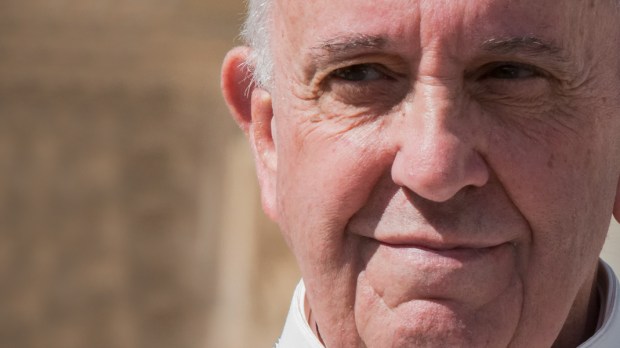Amoris Laetitia hopes to resolve the situations of many in the modern world, but is far more likely only to add further fuel to the holocaust. It doesn’t take a crystal ball to predict that once Communion can be taken by the divorced/remarried in some circumstances, it will soon be assumed licit by all. And – why not? – by people in gay relationships, who probably have an equally good claim to mitigating circumstances. The pope spends many pages explaining how culpability and circumstances may qualify absolute moral principles without compromising the fullness of truth. (No thoughtful person has ever denied this, of course.) He even quotes Aquinas in this context – who is not exactly a poster boy for the kind of “pastoral” change the pope is suggesting. Expect protests from the Thomists.
His conclusion:
For all his claims to the contrary in these many pages, Francis seems more interested in bringing people comfort than full conversion to what Christ clearly taught on marriage.
The New York Times story on the exhortation quotes the editor of First Things, among others:
Conservative Catholics, who have already expressed concern that Francis could destabilize the church and undermine doctrine, were far less impressed. R. R. Reno, a Catholic theologian and editor of First Things, a conservative journal of religion and public life, lamented what he called a “muddy” document that substitutes the church’s “rules and laws and requirements” with “talk about ideals and values.”
“I think it’s an ill-judged shift,” Mr. Reno said. “This document clearly opens up the possibility that a priest may determine that a divorced and remarried person is worthy to receive communion, but under what terms and why is muddy.”
…The document “does not inspire joy in L.G.B.T. Catholics and their supporters,” said Francis DeBernardo, the executive director of New Ways Ministry, an advocacy group for gay Catholics.
“While not expecting a blessing on marriage for lesbian and gay couples, many were anticipating that Pope Francis would offer an affirming message to L.G.B.T. people, and not the same ill-informed comments,” said Mr. DeBernardo, who is based in Maryland. “Where is the Pope Francis who embraced his gay former student and husband during his U.S. visit? Where is the Pope Francis who invited a transgender Spanish man for a personal meeting at the Vatican? This Pope Francis is hard to find in his latest text.
Meantime, Bishop Daniel Thomas of Toledo has released a statement on the document:
As the title of this exhortation suggests, Pope Francis believes the Catholic Church can do more to assist families in rediscovering joy and hope in family life. The Holy Father encourages us not to allow fragile, complex or irregular situations to steal the joy that perseverance in faithful, generous and life-giving love brings to the world in a powerful way.
Amoris Laetitia signals no change in Church teaching on sensitive and controversial matters, such as divorced and remarried Catholics and same-sex unions. Pope Francis calls all in the Church to a culture of encounter and accompaniment. The Holy Father desires all of us to rediscover the beauty of living the teachings of Jesus that show us the path to true love and true joy. He calls us neither to condemn nor condone, but instead to meet people where they are, no matter the situation, and draw them into the transforming love of Christ. This document is all the more significant when read through the lens of this Jubilee Year of Mercy, a year which proclaims not anything goes, but anything forgiven.
I hope and pray that anyone who feels estranged or confused by the Church’s teaching will seek the care and assistance of our local pastors, and encounter the mercy and healing of Jesus.
In the introduction to his exhortation, Pope Francis encourages us to read
Amoris Laetitia patiently and carefully in order to avoid a “rushed reading of the text” (AL #7). We look forward to the fruit that the study of this document will bring to the lives of the families of our Diocese.
Bishop Kevin Farrell of Dallas writes on his blog:
As this is a pastoral document, the Pope neither proposes or anticipates changes in the Church’s traditional teaching, yet points out that “When faced with difficult situations and wounded families, it is always necessary to recall this general principle: ‘Pastors must know that, for the sake of truth, they are obliged to exercise careful discernment of situations’ (Familiaris Consortio, 84). The degree of responsibility is not equal in all cases and factors may exist which limit the ability to make a decision. While clearly stating the Church’s teaching, pastors are to avoid judgements that do not take into account the complexity of various situations.”(AL, 79) There are those who will be disappointed with this document; some who feel it does not go far enough in addressing the hopes of those in irregular marriages, others who feel it compromises traditional teaching. In my opinion, it reflects the call of Jesus to his church to continue his healing and saving mission.
And finally, there’s this from Elizabeth Scalia:
What struck me about Amoris Laetitia, is how clearly it demonstrates the consistency of Francis’ thinking, and what he seems to have embraced within his Petrine mission. There are really no surprises in this document — and no change in doctrine, because this is more about how we find the pastoral way to the doctrine — but there is clear evidence that certain themes run deep within the Holy Father’s spiritual understanding, and they are of-a-piece with a world-view that is founded not on a continual quest for “progress” but instead leads us back to what is instinctive to our humanity. Back to the garden, as it were; to what is natural.

